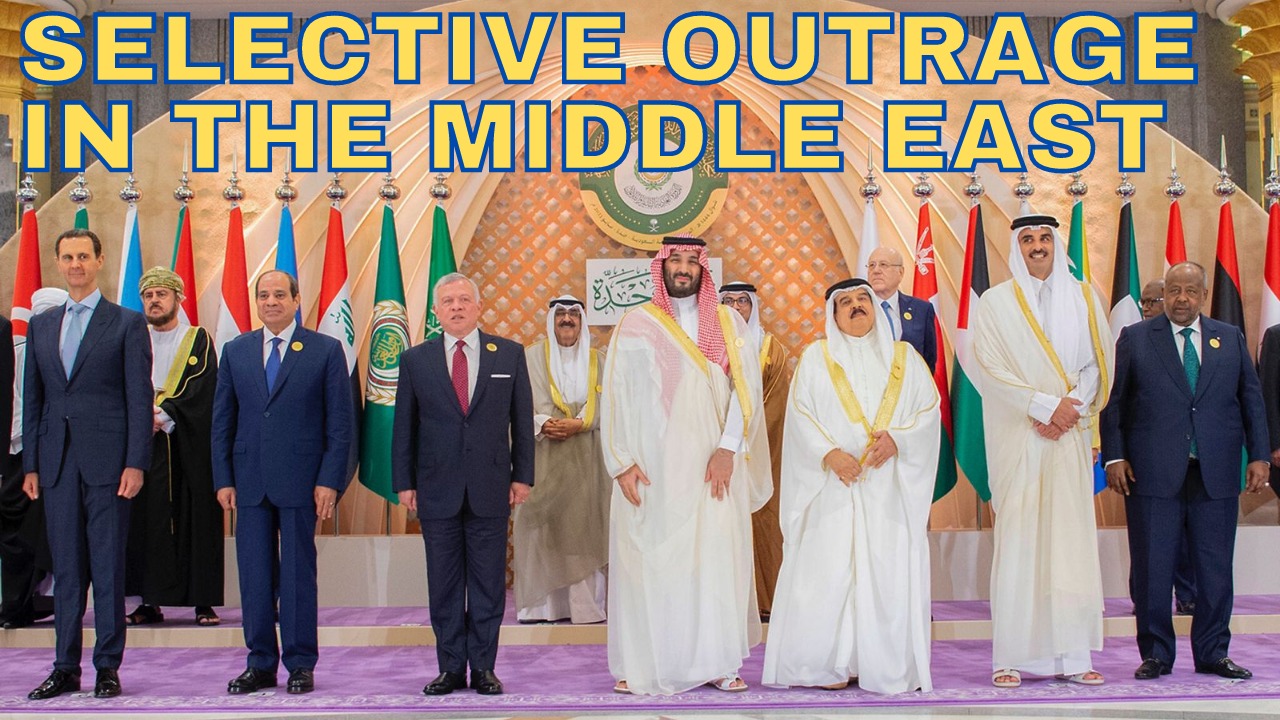SELECTIVE OUTRAGE IN THE MIDDLE EAST

Muslim leaders from 57 countries gathered earlier this week in Saudi Arabia for an emergency summit to discuss the ongoing war in Gaza between Israel and Hamas. A press release by the Saudi Foreign Ministry called the gathering a “response to the unprecedented circumstances in Gaza.”
What is certainly unprecedented was the joint participation at this summit of two sworn enemies: Saudi Arabia and Iran. There’s a maxim popular among non-profit fundraisers: there’s only one thing two philanthropists can agree upon, and that is what the third one should be giving to charity. It appears that if there is one thing all Islamic countries can agree upon, even those that hate each other, it is that Israel has no right to react with military force when its sovereignty has been breached, and its citizens slaughtered in the most savage attack against Jews in modern history.
Consider the fact that Syria’s president, Bashar al-Assad, attended the summit. Since 2011, a brutal civil war has raged in Syria. According to most estimates, over half a million Syrians – all Muslims – have died, many of them as a direct result of military actions by the Syrian army loyal to Assad.
Besides for a few half-hearted attempts by the Arab League early in the war to stem the violence, the huge losses in Syria have been largely swept under the carpet, and sanctions against Syria have been stymied by conflicting political interests. With that in mind, Assad’s presence at a summit whose purpose it is to halt Israel’s tough military response against Hamas in Gaza is at best ironic, but more precisely it is gross hypocrisy.
Assad’s most reliable supporter in the Islamic world is Iran, a country that has its hands dripping with Muslim blood. During the 2019 nationwide protests in Iran against the regime, Amnesty International reported that over 300 people were killed by security forces, while other sources suggested that the death toll could have been as high as 1,500.
In Yemen, Iran supports the Houthi rebels, whose violence against fellow Muslims is nothing less than barbaric. The Armed Conflict Location & Event Data Project (ACLED) has reported 100,000 direct conflict deaths in Yemen since 2015. And yet, no summit of Islamic states has been called, and it would appear that the death of these Muslims is not considered as egregious as the death of those who have perished as a result of Israel’s defensive war in Gaza.
But most offensive of all was the participation at the summit of Qatar – self-declared “honest broker” of the Middle East, as stated by their Washington ambassador, Meshal bin Hamad Al Thani, in a Wall Street Journal op-ed last week. This is the same Qatar that has proudly hosted and embraced the political wing of Hamas in Doha for decades, and also funded its governing arm in Gaza to the tune of 30 million dollars a month for years.
The West’s tolerance for Qatar is no longer viable. Qatar is a state sponsor of terror, no different to Iran, and yet it is welcomed by the West with open arms, and treated as an equal. This tiny Gulf country is made up of 90% non-citizen foreign workers, and is politically controlled by one family – the Al Thani clan – which not only rules this theocracy with an iron fist, but exerts a troubling financial influence across the world.
In the UK, Qatar’s primary vehicle for investments is the Qatar Investment Authority (QIA), which holds assets valued at nearly £400 billion. This includes significant stakes in iconic London landmarks like The Shard, as well as Heathrow Airport, Barclays Bank, and Sainsbury’s.
The Qatari royal family owns a substantial amount of real estate across the UK, encompassing over 4,000 properties that range from luxury hotels to industrial sites. Prominent hotels in their portfolio include The Ritz, The Savoy, The Connaught, The Berkeley, and Claridge’s. QIA also has significant shares in the London Stock Exchange Group, Severn Trent, Shell, Airtel Africa, and THG.
All of which means that sanctioning Qatar is not considered a possibility by the British government, which last year immediately slapped sanctions on oligarchs associated with President Putin of Russia after he invaded Ukraine.
Meanwhile Qatari billionaires who actively fund Hamas terrorism are given a free hand to operate in London, and in other international financial centers. Even King Charles is beholden to Qatari billionaires. As Prince of Wales, he received approximately £2.6 million in cash from Sheikh Hamad bin Jassim bin Jaber Al Thani, former prime minister of Qatar, and business partner of the Emir of Qatar’s father, himself the former Emir of Qatar. The cash gift, which was meant for charitable purposes, raised eyebrows although it was not deemed illegal.
The gathering of Muslim leaders in Saudi Arabia, paradoxically uniting traditional foes over a shared stance on Gaza, while overlooking deeper, more pervasive conflicts within the Islamic world, exposes a stark dichotomy in regional politics. The presence of Bashar al-Assad and the participation of nations such as Qatar and Iran, each with their own contentious records, underscores a troubling inconsistency.
This dichotomy is further amplified by the contrasting international responses to different conflicts and actors in the region and beyond. Even as the summit convened to address the crisis in Gaza, it inadvertently highlighted a broader, more systemic issue: the selective outrage towards Israel in the face of other far worse regional conflicts and human suffering. This pattern of selective attention and response not only undermines efforts towards regional stability and justice, but also raises critical questions about the criteria that guide international diplomacy and intervention.
The Saudi summit serves as a stark reminder of the complexities and contradictions that continue to define Middle Eastern politics and the challenges that lie ahead in achieving a consistent and equitable approach to peace and justice in the region. Ignoring these contradictions and challenges would be a grave mistake.

